Contributing Writer
Aftertreatment Upkeep Starts With Relationships
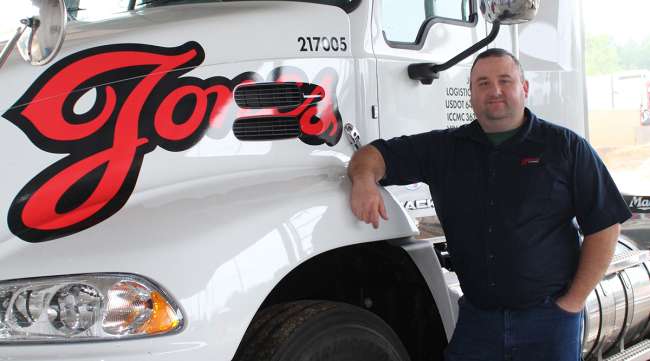
[Stay on top of transportation news: Get TTNews in your inbox.]
Building positive relationships with dealers and independent maintenance shops is one of the keys to successfully maintaining complex engine exhaust aftertreatment systems, according to several fleet representatives.
Mississippi-based Jones Logistics has no maintenance shops and outsources all of its work for its 107 trucks and 490-plus trailers. The company contracts with a vendor that does on-site maintenance and has a network of vendors along its routes.
“For me, it’s built around working with the vendor, really building that relationship with them and making them understand what you want and what you need,” said Bryan Stewart, director of maintenance. “They’ve got to be on your team.”
Stewart travels often to build a national network. Working with his operations staff members, he’ll study a route and then visit facilities along that route. The key is making sure vendors understand how he wants his program run, and not simply fit his trucks into their preconceived patterns.
He said he spends more time on vendor relations than he does spec’ing equipment. “It’s really become that important,” he said.
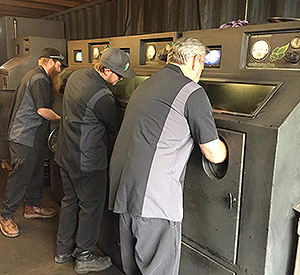
Technicians with Clean Diesel Specialists clean diesel particulate filters. (Clean Diesel Specialists)
Jack Legler, technical director for American Trucking Associations’ Technology & Maintenance Council, hasn’t surveyed fleets but suspects using outside aftertreatment vendors could be a trend. The equipment is technically complex, and improper maintenance can lead to big problems.
Fleets must screen contractors carefully. For example, vendors should use OEM-spec’d fluids because others can seriously damage pollution-control equipment. The urea can crystallize and clog the system — Legler compared it to atherosclerosis — eventually leading to a costly repair.
“Were it my multihundred-thousand dollars’ worth of truck, I wouldn’t trust it to someone I didn’t know,” he said.
Other fleets contacted for this story said they develop relationships with outside vendors before they need them.
Cindy Crawford, group director of field maintenance for Ryder System Inc., said the Miami-based company handles most of its aftertreatment repairs in-house, including diesel particulate filter replacements.
The exception would be when it faces a capacity issue with its 270,000 vehicles under management, the vast majority of them trucks. Field vendor managers negotiate relationships between local shops and vendors.
Crawford said Ryder’s networks include independent shops. However, those would not be involved in any DPF cleanings. For those, technicians rely on engine manufacturers through their dealer networks.
“We feel they know their aftertreatment system really well, and they’ve perfected their process, and so we leverage that,” she said.
Ryder Supply Chain Solutions ranks No. 11 on the Transport Topics Top 100 list of the largest for-hire carriers in North America.
Bruce Balfour, vice president of Clean Diesel Specialists, a vendor that specializes in emissions systems, said one challenge facing fleets is the lack of a DPF cleaning standard.
He is chairing a TMC committee drafting a recom- mended practice document that, as of late September, needed to be approved by TMC membership.
That standard is needed, he said, because, “It’s the wild, wild West out there when it comes to cleaning filters.”
Paul Pettit, P.A.M. Transport’s vice president of maintenance, said his fleet replaces filters in-house but outsources cleanings. The fleet keeps clean swing DPF units in each shop to swap out with dirty filters because the typical turnaround time is about 24 hours. Dirty filters are sent to OEM dealers that are near the fleet’s 10 terminals.
P.A.M. Transport always goes to the closest dealer when it has an aftertreatment system problem. It works only with dealers because of warranty concerns and because they have more experience and “the latest and greatest training and technology,” Pettit said.
Headquartered in Tonitown, Ark., P.A.M. Transport ranks No. 65 on the for-hire TT100.
Steve Studer, director of maintenance for CFI, said his fleet typically does all of its aftertreatment work in-house or with dealers. When dealing with issues over the road, it only outsources to dealers.
The company has an extensive vendor map showing which vendors it has a working relationship with — and those it will not use or would prefer not to use. Studer said the company is upfront about its expectations, directly addresses when they are not being met and is loyal to shops that do meet them.
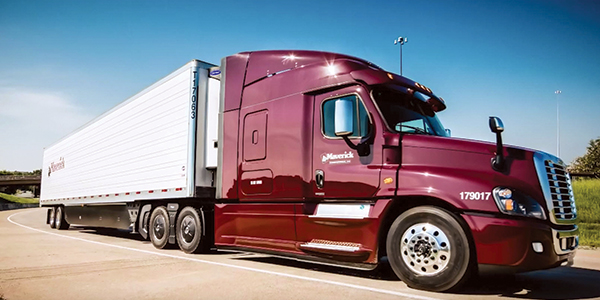
At Maverick Transportation, service managers set performance indicators with vendors. (Maverick Transportation)
At Maverick Transportation, Corporate Service Manager Jon DeBusk said that during initial visits, the fleet’s district service managers learn about providers’ capabilities, how they handle parts stocking and availability, and hours of operation. Service managers outline Maverick’s expectations and establish key performance indicators with vendors, he said. Later, service managers use a scorecard to show vendors where they are excelling and where they need to improve.
When the fleet experiences issues over the road, it tries to utilize dealer and distributor networks, but there are times when it uses independent shops, DeBusk said. The relationships are already built into the areas where they run, but if a truck breaks down elsewhere, the district service managers find a provider and then begin traveling in that area to prepare for future needs.
When forced to rely on an unfamiliar vendor, Maverick involves the original equipment representative from the beginning, DeBusk said.
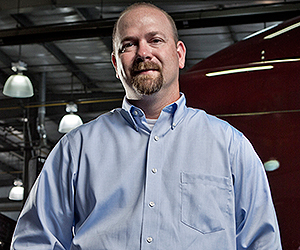
DeBusk says there are times when Maverick Transportation uses independent shops. (Maverick Transportation)
“They have industry knowledge and relationships that go a long way to getting us in the shop as quickly as possible and ensuring that the right parts are on hand or expedited quickly if they have to be shipped,” he said. “They can also help out with the warranty aspect of the repair since they were involved on the front end. They work hard to get us back on the road and hauling freight.”
Maverick USA ranks No. 77 on the for-hire TT 100.
Jones Logistics’ Stewart said he spot checks vendors unannounced. After a cleaning, he requires pictures of the work — before and after. If he has questions, he’ll have another vendor take apart the aftertreatment system and snap more photos just to ensure the ones he was shown came from his truck.
Balfour, of Clean Diesel Specialists, said the company’s factory-trained technicians provide services for large and small fleets. For some, they provide single-source services for all DPF needs. They’ll go on-site, provide diagnostics, replace filters, clean them and reset the codes.
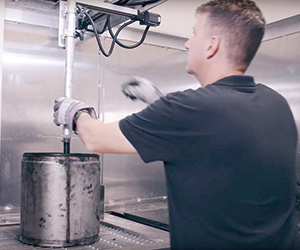
A technician prepares a filter for cleaning in a diesel particulate cleaning machine. (EcoClean via YouTube)
Fleets should be sure they are working with independent providers that are serious about their work, Balfour said. For example, if the ash counter isn’t reset after a cleaning, a fleet will have to deal with the resulting confusion and expense after the service reminder light appears. He emphasized that fleets should visit the cleaning facility to ensure the company is trustworthy.
“I can’t tell you how much we appreciate a customer that gets involved and comes to see us,” he said. “It happens time and time again where a customer wants to see what we do, what our operation is and what we’re all about. I love that customer because they’re well-informed.”
Balfour said fleets shouldn’t be swayed by promises of low costs or fast speeds. A filter can’t be properly cleaned in two hours or for cut-rate prices, he noted.
Stewart said he travels to each of his vendors four or five times a year to show his appreciation. He’ll often take a Yeti tumbler with a Jones Logistics logo as a small gift.
“That goes miles with those guys because I’ve taken things in and given to them, and they’re like, ‘We’ve been working on trucks for 20 years. I’ve never had a customer bring us anything,’ ” he said.
Want more news? Listen to today's daily briefing:

